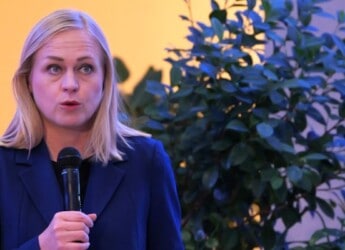Editor’s Note: The recent United Nations resolution on artificial intelligence marks a pivotal moment in the global governance of this transformative technology. As AI continues to advance at an unprecedented pace, it is crucial that we come together as an international community to ensure its development and deployment align with our shared values and promote the greater good.
This resolution, co-sponsored by over 123 countries and unanimously adopted by the U.N. General Assembly, sets a powerful precedent for collaboration and consensus-building in the face of complex technological challenges. By emphasizing the importance of safeguarding privacy, protecting human rights, and harnessing AI for sustainable development, the resolution provides a roadmap for nations and industries to follow as they navigate the uncharted waters of AI innovation.
However, the work does not stop here. As the resolution itself acknowledges, translating these principles into practice will require ongoing cooperation between governments, civil society, and the private sector. It is up to all of us—policymakers, tech leaders, and engaged citizens alike—to remain vigilant in monitoring the risks and opportunities presented by AI and to take proactive steps to shape its evolution in a manner that benefits humanity as a whole.
Content Assessment: United Nations Adopts Landmark AI Resolution to Secure Trustworthy Technological Progress
Information - 92%
Insight - 90%
Relevance - 91%
Objectivity - 87%
Authority - 88%
90%
Good
A short percentage-based assessment of the qualitative benefit expressed as a percentage of positive reception of the recent article from ComplexDiscovery OÜ titled, United Nations Adopts Landmark AI Resolution to Secure Trustworthy Technological Progress."
Industry News – Artificial Intelligence Beat
United Nations Adopts Landmark AI Resolution to Secure Trustworthy Technological Progress
ComplexDiscovery Staff
After months of diligent negotiation and collaboration among global leaders, the United Nations General Assembly has unanimously adopted a landmark artificial intelligence (AI) resolution, marking a historic step towards securing safe and trustworthy technological advancements. The resolution, spearheaded by the United States and co-sponsored by over 123 countries, aims to provide comprehensive guidance on deploying and managing AI technology, paying special attention to its benefits and potential challenges.
The resolution, entitled “Seizing the opportunities of safe, secure and trustworthy artificial intelligence systems for sustainable development,” stresses the importance of protecting personal data, enhancing privacy policies, and upholding human rights through the careful monitoring of AI for risks. Commended by senior administration officials, the measure stands as a testament to the power of international cooperation in steering the evolution of technology in the light of shared values.
The inception of this project began about three months ago, and a senior U.S. official revealed the United States’ commitment to leading efforts in global AI governance. It involved hundreds of hours of direct talks with individual nations and extensive negotiations, culminating in this consensus resolution. According to Jake Sullivan, the U.S. National Security Advisor, the objective behind the United States’ push is to manage the implications of rapidly advancing AI technology while safeguarding democratic principles, privacy, and human dignity.
With the resolution’s passage, the U.N. takes a definitive stance on cultivating AI that aligns with sustainable development goals. This momentous occasion reflects extensive consultations with civil society and private sector experts, emphasizing priorities relevant to developing countries and exploring how AI can advance quantum leaps in sectors such as healthcare, agriculture, and education.
U.S. Ambassador Linda Thomas-Greenfield’s remarks prior to the adoption highlighted the choice now before the global community—to govern AI or risk being governed by it. She stressed the collective responsibility to ensure that AI is created and deployed with a focus on human rights and fundamental freedoms.
Echoing the sentiment of unity and progress, Vice President Kamala Harris called the resolution a pathway where AI can be mobilized for sustainable development, allowing all nations to access AI resources and expertise with a keen understanding of safeguarding citizens’ safety, privacy, and rights.
The resolution results from a growing consensus that amidst the opportunities presented by AI, inherent risks and challenges must be addressed. Countries worldwide, including Europe and Britain, are crafting regulations to harness the full potential of AI while mitigating its risks. The United States, acknowledging the importance of such measures, has taken steps with President Biden’s executive order last October focusing on risk management for AI to enhance national security. As the U.N.’s first stand-alone resolution on AI, the initiative sets a global precedent for the governance of emerging technologies.
As technology advances, the private sector’s role remains crucial. With notable input from industry giants like Google and Microsoft and intense public engagement from innovative platforms like OpenAI’s GPT-4 and Elon Musk’s xAI, the private sector is poised to translate these global principles into practice significantly. Microsoft Vice President Brad Smith praised the adoption, signaling industry support for global standards on AI ethics and sustainable development.
The European Union has already made strides with its Artificial Intelligence Act, and the U.S. continues to build upon its legislative framework. Meanwhile, the House of Representatives has cast a spotlight on technology platforms with sweeping legislation aimed at foreign-owned apps like TikTok, highlighting security concerns.
This U.N. resolution ushers in a new era of AI governance, with each nation and sector of society recognizing its vital role in shaping a future where technology serves humanity’s needs and upholds the dignity and rights of all individuals. It is a clear call for international collaboration, cautious optimism, and resolute action in the digital age.
News Sources
- US Leads Charge For Global AI Regulations At UN — Here’s Why It Matters
- US spearheads first UN resolution on artificial intelligence — aimed at ensuring equal access
- White House hails first UN AI resolution as ‘landmark achievement’
- World’s first global AI resolution unanimously adopted by United Nations
- AI Regulations Passed In Europe, But Also Need To Be Enacted In The US
Assisted by GAI and LLM Technologies
Additional Reading
- Generative AI and the First Amendment: Legal Experts Weigh in on the Need for Regulation as Election Nears
- Prompt Engineering: The New Vanguard of Legal Tech
Source: ComplexDiscovery OÜ



























